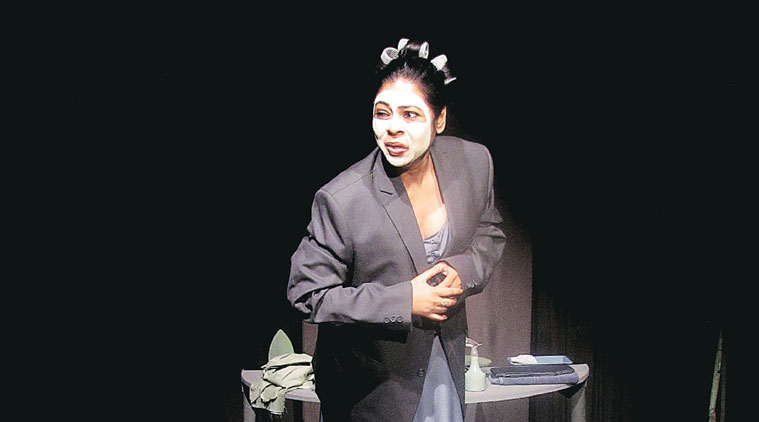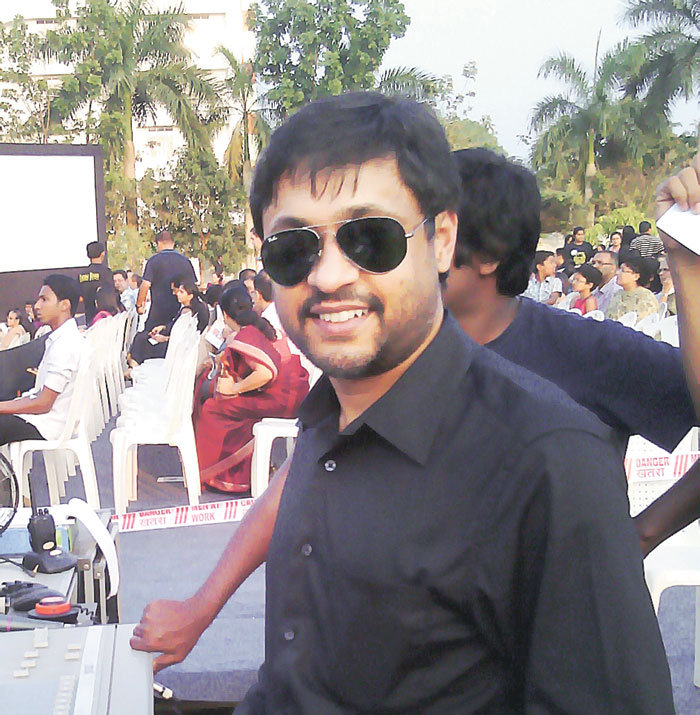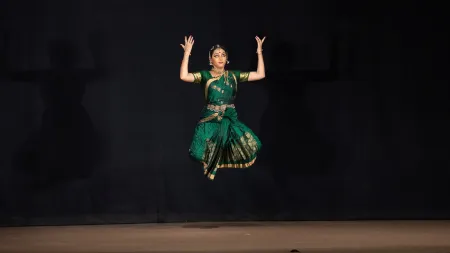- India
- International
Theatre provides working professionals the perfect opportunity to unwind
Some of India’s best-known actors are emerging from different professional fields. They have full-time jobs but end their evenings with theatre.
 Sanchayita Bhattacharjee during a performance of A Woman Alone
Sanchayita Bhattacharjee during a performance of A Woman Alone
Had she remained in her kitchen, chef Sanchayita Bhattacharjee would not have met the Housewife. “She is like a fiery curry that starts slow, melts in your mouth and then hits you in the back of your head,” says Bhattacharjee, who plays the central character in A Woman Alone, a black comedy about a simple housewife whose jealous husband keeps her imprisoned in their house. Only a seasoned actor can make this seem funny. Bhattacharjee, a Le Cordon Bleu chef with her own multi-cuisine restaurant in the heart of Kolkata, drew upon a lifetime of acting and cooking for this role — she crafted it like an onion, with hysterical and humorous layers arranged like peels over a green core — and played it to critical acclaim.
Like Bhattacharjee, some of India’s best-known actors are emerging from different professional fields. They have full-time jobs but end their evenings with theatre. IAS officer Rakesh Gupta donned a pink bow tie and turned into an eligible bachelor in the musical Hello Dolly. Smita Mazumdar Rajaram, deputy director of a social developmental communication consultancy, recently played the femme fatale at the heart of a murder trial in The Kambatta Case, inspired by the 1959 Nanavati scandal. The Importance of Being Earnest’s lovesick maiden Cecily is, in reality, number-crunching business analyst Rishibha Kawatra. “With a script in hand, I walk into somebody else’s life and discover facets of different human beings in myself,” says Bhattacharjee, who has been performing for 40 years.
Don’t look for drama school degrees in this crowded community but listen, instead, to the stories of passion. Most working professionals have been with theatre since it brought them fame in school while others, such as Vijay Crishna, executive director of Godrej & Boyce Manufacturing Co Ltd and a veteran of 100 productions, came to it while working, and never left. Unlike classical or fine arts, theatre does not demand constant worship and is free from the self-flagellation of performance art.
 Vijay Crishna
Vijay Crishna
Few stage regulars would call theatre a medium of relaxation. Exhaustion is a more likely answer, with lightning streaks of exhilaration at intervals. The hurly burly of a production includes turning up at every rehearsal and show day, learning lines, remembering “blocking” or movements on stage, costume fittings, designing sets, booking auditoriums and making it all look effortless. There are long train journeys in the second class, unlimited chai and penny pinching, a world apart from boardrooms and coffee-shop networking. In the closed space of a hall, a group of passionate individuals forget their own lives and step into somebody else’s nightmare or celebration. They who cannot appreciate this pain or pleasure do not belong, for theatre chooses its own.
 Ekant Kaul as Babur in the play Sons of Babur
Ekant Kaul as Babur in the play Sons of Babur
“Certain shows don’t let you sleep,” says Mumbai-based seafood exporter and sound engineer Gautam Dhanu, who has worked with Alyque and Raell Padamsee extensively. Among the few people who never wanted to be an actor, Dhanu specialises in soundscaping plays, from Jesus Christ Superstar to Sound of Music to Between the Lines. During the day, he sources seafood from coastal regions, tracks trade figures, executes international orders, despatches stock to hotels and airlines and monitors the progress on his shrimp farm in Srivardhan near Mumbai. “The only relaxation that takes my mind off work is theatre,” he says and proceeds to describe a routine that sounds even more aggressive than his job. Actors might get a backstage breather but Dhanu is tuned to his sound equipment, his eyes on the script and his imagination rolling through the scenes. “I am scared every time, be it the first show or the 50th. If the mike has to go on when a singer performs, it has to go off immediately afterwards. If the doorbell doesn’t ring at the right time, or the telephone doesn’t sound, it can throw an actor off,” he says. Some shows are so challenging that they require an input every 30 seconds. “After a two-hour play, it takes a long time to recover. Every scene thunders back into my mind, line by line, for the next three days,” he says, adding happily, “To win the day is the perfect reward.”

 Gautam Dhanu
Gautam Dhanu
After 50 years in the corporate sector and as an actor, Crishna shares Dhanu’s passion. “How do I make time for theatre is sometimes more of a challenge and sometimes less, but it is always a challenge. Every job has deadlines, you have to come up with the goods to manage it,” says Mumbai-based Crishna, who has been on stage since 1965 and did not stop as he changed jobs and cities. Serious roles, such as Iago, a dangerous friend to Kabir Bedi’s Hamlet, and Macbeth make up his repertoire. The 70-year-old was recently in Slovenia with Take Me In Your Hands, a play about a man of letters who meets a girl of action as she wanders into his bookshop. “As a result of the work I do in theatre, I am a better person at work. Working with people is a complex thing. In theatre, we work with actors, technicians and production persons. Each one of us has to work in sync with the other. I think it made me understand people better,” says Crishna.
The working professionals have as long a play list as full-time theatrepeople — and their survival instincts have been sharpened by chasing deadlines. Delhi-based Ekant Kaul is an engineer whose client includes UIDAI, as well as an astute actor of 300 productions in 20 years. He was “ready to drop dead on a laptop at 6 pm,” one tough day in office when he remembered that rehearsal would start in an hour. “When I arrived, the director gave me the script for Kuchh Ishq Kiya Kuchh Kaam and said the show was in 10 days. I was playing the lead, the poet Faiz Ahmed Faiz. Ten days? There was no time for family or friends, I used every moment to read on Faiz, watch his videos and learn his Urdu poems. As I panicked, Faiz came to my rescue. He had been a carefree man, who wrote romantic poetry when he was in jail. I told myself that I would not worry. No more stress. Let me do it the way Faiz would have wanted,” says Kaul. On opening night, he arrived with a flourish and ended with a perfectly executed poem. The audience was on its feet. “They were clapping and applauding and I realised why I loved theatre so much. I use my office leave days for theatre shows and tours, miss birthdays and cousins’ weddings but that is a world well lost,” he says.
Story appeared in print with the headline Art is long and life is short
Apr 19: Latest News
- 01
- 02
- 03
- 04
- 05


































